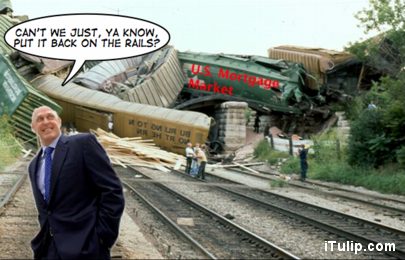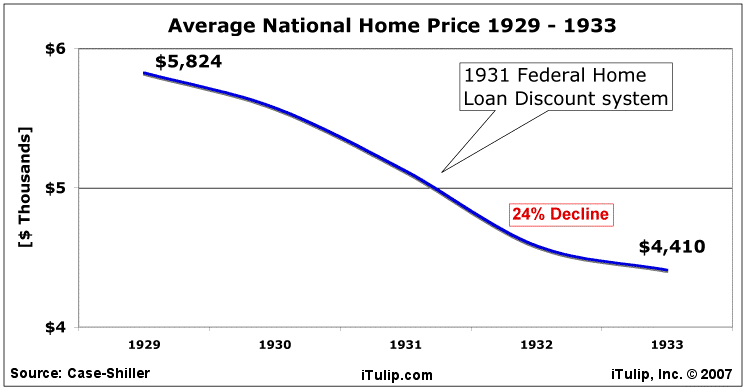 |
Whip Asset Price Deflation Now (WAPDN?)
by Eric Janszen
WAPDN may not have the same "ring" to it as President Gerald Ford's unpopular disco era attempt at populism, his ill-fated "Whip Inflation Now" anti-inflation campaign, but it will work just as well–not at all.
According to WikiPedia:
Whip Inflation Now (WIN) was an attempt to spur a grassroots movement to combat inflation by encouraging personal savings and disciplined spending habits in combination with public measures, urged by U.S. President Gerald Ford. People who supported the mandatory and voluntary measures were encouraged to wear "WIN" buttons, perhaps in hope of evoking in peacetime the kind of solidarity and voluntarism symbolized by the V-campaign during World War II.
Alas, grass roots were no match for the government printing press, and though inflation following Ford's famous "WIN" speech October 8, 1974 declined from an insolent height of 8% to a more respectful 2%, it shot up to an impudent 9% then rose to stand contemptuously at 10% in 1979.The whole idea seems silly today–because it was. Might such a ludicrous anti-inflation scheme be considered by a U.S. President today? Of course not, but not because Americans are any more wise to monetary principles. Recall post-9/11 speech by President Bush to encourage consumers, formerly known as citizens, to keep spending or else "the terrorists win," in effect, to Whip Deflation Now. That worked because asking Americans to spend more is like asking crack addicts to smoke more. Sure, says the addict. Got more credit crack? Of course we did.
The latest effort by government to engineer money aggregates via government consumer behavioral engineering promotions arrived yesterday in the form of a tiny bailout of a small bit of a subset of the now rapidly collapsing U.S. housing market. This was aimed not so much to keep consumers spending as to keep the Democrats from hogging the populist limelight.
Some day all this direct consumer and voter lobbying will come back to haunt us. All governments propagandize their citizens to support government economic policies, whether to save or not save, usually for decades at a stretch, only to run into economic circumstances that cause the carefully cultivated religious observance of economic policy to backfire.
Take Japan in the 1990s, for instance. Since after WWII, the government demanded citizens sacrifice and hoard, and so they did. Between 1945 and 1990, Japan became the greatest national saver and creditor on earth. The Japanese people's compliance with policy, which is consistent with an anti-debt culture, made Japanese mercantilist economic policy possible. In the early 1990s after the asset price crash and banking crisis, when Japan began to experience goods and services price deflation, the government attempted to reverse decades of propagandizing and get the people out to the malls to spend, spend, spend. Turning Japanese savers into American-style spenders turned out to be as futile as President Ford’s experiment in the U.S. in the 1970s to do the reverse.
Japanese politicians are not greater fans of a market's natural tendency to deliver V-shaped price corrections, preferring an elongated U or, if possible to engineer, an endless string of nominal "_" marks while inflation eats away at the real price the flat line represents on a graph. What the Japanese got for their efforts to manage the collapse of the 1980s asset price hyperinflation was an economy that has see-sawed in and out of recession for going on 20 years while inflation puttered between plus and minus two percent.
The Great Depression was American’s last lesson in the wisdom of saving for a rainy day. For several generations since it’s been bailout city–and nothing teaches spendthrift habits like the moral hazard of repeated, multi-generational debtor bailouts.
Each time recession approaches, the first casualty of U.S. politicians’ refusal to discourage voters’ propensity to borrow and spend is the currency itself, repeatedly thrown under the bus in the name of economic stimulus every time the economy attempts to rid itself of the accumulated excesses of the previous period of economic growth. President Nixon was the first to do so without ceremony, but subsequent administrations have been no less inclined, albeit far less obvious, about it when the need arose.
After spending decades coddling U.S. consumers, I mean, citizens with bailouts that encouraged them to borrow and spend beyond their means, the penultimate was achieved in Q4 2005 when the household savings rate turned negative.
 |
Airbag Economy
The latest effort to inflate the economic airbags came from the head of U.S. Treasury Department, Secretary Andrew William Mellon, who resigned from his position as the head of the nation’s largest bank to take the position, now serving Republican President Hoover. Oops. Sorry. Wrong post credit bubble era. I meant Treasury Department Secretary Henry Paulson, who resigned from his position as the head of the nation’s largest bank to take the position, now serving Republican President Bush. And, no, today’s credit crisis has not resulted from cascading debt defaults after more than 50% of the nation’s banking resources were committed as margin credit to hyperinflated stock prices through non-transparent cross-investments among investment trusts. One could draw a virtuous comparison to the recent commitment of 60% of loans on the balance sheets of the nation’s banks to mortgage debt backing trillions of dollars of mortgages collateralized by hyperinflated housing prices and funded by risky and over-priced securitized debt instruments, but you have to drawn the line somewhere. We draw it here: we’re much, much smarter today than those dopes back in the 1920s and 1930s. To wit:
"Next to food and clothing, the housing of a nation is its most vital problem. . . . The sentiment for home ownership is embedded in the American heart [of] millions of people who dwell in tenements, apartments and rented rows of solid brick. . . . This aspiration penetrates the heart of our national wellbeing. It makes for happier married life. It makes for better children. It makes for courage to meet the battle of life. . . . There is a wide distinction between homes and mere housing. Those immortal ballads, 'Home, Sweet Home,' 'My Old Kentucky Home' and 'The Little Grey Home in the West' were not written about tenements or apartments. . . . They were written about an individual abode, alive with tender associations of childhood, the family life at the fireside, the free out-of-doors, the independence, the security and the pride in possession of the family's own home. . . . Many of our people must live under other conditions. But they never sing songs about a pile of rent receipts. . . ."
Over these warm words and some 1,900 others like them President Hoover had worked with a full heart for two months. One evening last week he took them all, in the form of a keynote address, to Constitution Hall and there, in a voice brimming with emotion, delivered them to the assembled delegates of the President's Conference on Home Building & Home Ownership. At this great gathering President Hoover again demonstrated his ability and leadership in an unofficial activity outside the constitutional realm of the Presidency.The conference's major purpose, President Hoover said, was "to stimulate industrial action," not "to set up government in the building of homes." To promote home owning the President urged a better system of home financing, thus keying his program in with his proposed Home Loan Discount system.
Home, Sweet Home, TIME Magazine, December 14, 1931

President's 1931 Home Loan Discount program did not prevent continued national home price declines.
As the current government and Wall Street engineered credit bubble implodes–and as Fed rate cuts, special Fed services at the Discount Window, and the short term goods export boosting effects of currency depreciation start to wear off–this next series of anti-asset price deflation measures, our read of history tells us, will be of a price-fixing variety.
Scooting ahead to a more modern instance of the practice of price fixing, we arrive at the 1960s to find government as unhappy with the political consequences of too high commodity and wage prices as with the political fallout of collapsing asset prices.
President Kennedy in 1962 criticizes the U.S. steel industry for raising
prices. Politicians like markets when they deliver rising asset prices,
but not rising commodity or wage prices. Those are bad.
Governments don’t like markets when they are delivering falling asset
prices, either. That’s bad, too.
Today we have both rising commodity and, soon, rising wage prices combined with falling asset prices. This combination will tax even the most creative politician’s price control measures: how to make Wall Street and Main Street happy at once?
The market solution for the inflation cycle that started around the time of Kennedy’s speech did not appear for another 20 years: stop printing so much goddamn money. It happened under Paul Volcker’s Fed in the early 1980s. Two successive massive recessions destroyed the pricing power of commodity producers and wage earners, wrecked the unions and thereby broke the primary means of transmission of inflation into the price cycle, ushering in the golden age of credit and asset price inflation.
Today, the market solution for falling real estate hyperinflation cycle is equally simple: let prices clear the market. That’ll never happen. Specific policy responses are difficultly guessed at with any certainty. We ask our contacts in the know but it’s apparent that the full scale and extent of the economic problem that confronts us, and them, has yet to dawn fully on the geniuses who created this mess, so they haven’t had a chance–yet–to develop equally ingenious “fixes.” Or if they have, they aren't letting on.
The Housing Crash has not Started Yet
It surprises us that housing prices are falling as quickly as they are so early in the correction process. Our January 2005 forecast notes a greater than 90% correlation between housing prices and employment, and that not until unemployment rises do real estate prices in a bust begin to decline in earnest. Yet here we are with unemployment still below 5% and, according to a reporting of Case-Shiller by Moody’s last week, housing prices fell at a 6.5% annual rate in the 3rd quarter of 2007.
Herb Greenberg at Marketwatch issued a report by Mark Hanson, a 20-year veteran of the mortgage industry, who has spent most of his career in the wholesale and correspondent residential arena. The headlines:
Sub-prime is what is being focused upon to draw attention away from the fact the lenders and Wall Street banks made all loans too easy to attain for everyone.
Sub-prime aren’t the only kind of loans imploding.
We have 90% fewer qualified buyers for five-times the number of homes.
Reinforcing Hanson’s point that the debt crisis is generalized and will therefore be hard to manage, our own real estate expert Sean O’Toole based in California, CEO of ForeclosureRadar.com, tells us that for every home that sold in CA last quarter, one went into foreclosure. At normal sales transaction volumes, current inventory in hard hit areas like San Joaquin County is good for five years’ demand, up from the usual six months’ supply. Of course, sales transaction volumes are far from normal; they are less than half. Sub-prime aren’t the only kind of loans imploding.
We have 90% fewer qualified buyers for five-times the number of homes.
To further underscore the breadth of the problem, we note one item stood out in the Fed’s quarterly Flow of Funds report issued Thursday:
Federal Reserve: Home equity falls in 3Q
(AP) Dec. 6, 2007
The amount of equity homeowners hold in their homes slipped in the third quarter to the lowest level on record, just above 50 percent, according to a report from the Federal Reserve Thursday.
In its quarterly U.S. Flow of Funds Accounts, the central bank reported that homeowners' percentage of equity dipped to 50.4 percent from 51.1 percent from the previous quarter. On average, housing is Americans' single largest asset.
Economists expect this figure, equal to the percentage of a home's market value minus mortgage-related debt, to tumble even further as falling home prices eat into equity. It could easily drop below 50 percent by the end of next year, some experts say, marking the first time homeowners will owe more than they own since the Fed started recording the data in 1945.
For the first time since WWII, the average U.S. “homeowner” will own less than half their home. If this comes to pass, and we have no doubt that it will, it’s time to officially shelve the term “homeowner” as under no definition we are aware of does a person have the right to declare ownership of an asset in which he or she does not have a controlling interest. (AP) Dec. 6, 2007
The amount of equity homeowners hold in their homes slipped in the third quarter to the lowest level on record, just above 50 percent, according to a report from the Federal Reserve Thursday.
In its quarterly U.S. Flow of Funds Accounts, the central bank reported that homeowners' percentage of equity dipped to 50.4 percent from 51.1 percent from the previous quarter. On average, housing is Americans' single largest asset.
Economists expect this figure, equal to the percentage of a home's market value minus mortgage-related debt, to tumble even further as falling home prices eat into equity. It could easily drop below 50 percent by the end of next year, some experts say, marking the first time homeowners will owe more than they own since the Fed started recording the data in 1945.
So much for the “ownership society.”
The desire by Bush and Paulson to put the U.S. mortgage train back on the rails via price-fixing mortgage rates is understandable, but the results will be the same as for any price-fixing operation: economic activity will decline as capital is withdrawn from the markets. A friend of iTulip's we visited in New York City last week, a veteran of Wall Street who started at Chase in the mid 1980s and became a successful hedge fund manager later, asked, If the government can annul contracts between bond issuers and bond buyers, who will want to issue bonds and who will want to buy them? Bloomberg quoted Kenneth Hackel, managing director of fixed-income strategy at RBS Greenwich Capital Markets who explained, “It could end up there's less confidence in the viability in the bond markets and the mortgage markets going forward and it could lead to higher interest rates and higher mortgage rates for everybody.”
In case you are tempted to go around the Treasury Dept. manipulated mortgage bond market and go directly to the source, not so fast. On December 3, the Treasury announced that effective January 1, 2008 the annual purchase limit for savings bonds will be reduced to $5,000 per year from $30,000. Further, our reading is that an individual, as identified by a social security number, cannot purchase more than $20,000 worth of a series (e.g., EE or I) bonds total ever. We’ll keep our eye on changes in TIPs purchasing rules for signs the government may be worried about excessive inflation-indexed bond liabilities as the political pressure to inflate away debt mounts.
 |
After years of wondering, now we are getting our answer.
Inflation is Political
Thousands protest over China ant aphrodisiac scheme
November 21, 2007
BEIJING (Reuters) - Thousands of people in north-eastern China have protested on the streets and surrounded government offices demanding help recovering money from a get-rich-quick scheme to raise ants to make an aphrodisiac tonic.
Hundreds of anti-riot troops and police in Shenyang, capital of Liaoning province, were deployed to stop protesters reaching the provincial government and Communist Party headquarters, residents said on Wednesday.
The investors -- many of them laid-off workers or farmers -- put their savings into Shenyang's Yilishen Group for a scheme in which they raised ants to provide ingredients for a health tonic promising an aphrodisiac boost.
The tonic was promoted on television by Zhao Benshan, the country's best-known comic who specialises in playing innocent bumpkins with a north-eastern twang.
Principles of government response to economic crisis are most clearly demonstrated at the extreme. The example above is what happens when a government creates an expectation on Main Street that the government is there to make them whole after the markets, run by racketeers, make off with their savings. We aren't seeing any U.S. citizens taking to the streets. But as the economic problems intensify in 2008, the stresses will crop show up ever more obviously in the political process and perhaps the crime rate. The squeaky wheels on Wall Street got the first grease, but as the squeaking spreads, so shall the grease. November 21, 2007
BEIJING (Reuters) - Thousands of people in north-eastern China have protested on the streets and surrounded government offices demanding help recovering money from a get-rich-quick scheme to raise ants to make an aphrodisiac tonic.
Hundreds of anti-riot troops and police in Shenyang, capital of Liaoning province, were deployed to stop protesters reaching the provincial government and Communist Party headquarters, residents said on Wednesday.
The investors -- many of them laid-off workers or farmers -- put their savings into Shenyang's Yilishen Group for a scheme in which they raised ants to provide ingredients for a health tonic promising an aphrodisiac boost.
The tonic was promoted on television by Zhao Benshan, the country's best-known comic who specialises in playing innocent bumpkins with a north-eastern twang.
Our bet has been a similarly elongated and drawn out collapse, in and out of recession, ala Japan since 1992, but with inflation stubbornly in the three to nine percent range, unless outside events invoke a more sudden inflation and get the process over with more expeditiously.
Deciding our long term investment allocations in the mix of these probabilities–a long inflation, a foreign dollar repatriation fueled inflation spike, and the Next Bubbles–in the next cycle will keep us busy for years to come.
iTulip Select: The Investment Thesis for the Next Cycle™
__________________________________________________
[SIZE=2]For a book that explains iTulip concepts in simple terms see americasbubbleeconomy
For the safest, lowest cost way to buy and trade gold, see The Bullionvault
To receive the iTulip Newsletter or iTulip Alerts, Join our FREE Email Mailing List
Copyright © iTulip, Inc. 1998 - 2007 All Rights Reserved
All information provided "as is" for informational purposes only, not intended for trading purposes or advice. Nothing appearing on this website should be considered a recommendation to buy or to sell any security or related financial instrument. iTulip, Inc. is not liable for any informational errors, incompleteness, or delays, or for any actions taken in reliance on information contained herein. Full Disclaimer
Comment